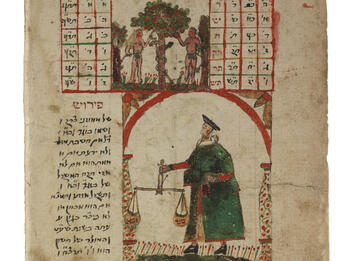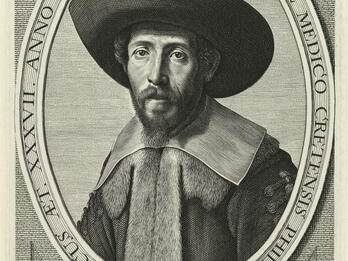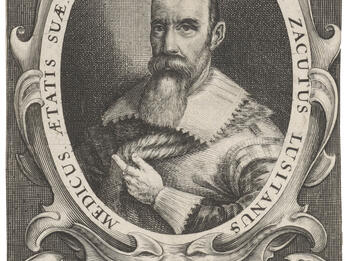Flagellum calumniantium (The Scourge of Calumniators)
In which the malicious charges of an unknown author are refuted, and the lust for lying of this person is disclosed, and the legitimate method of the most famous Portuguese physicians is recommended, while the ignorance and thoughtlessness of the empiric quacks is condemned for being prejudicial to the Commonwealth. . . .
by Philoteus Castellus
Amsterdam, A.D. 1631 [ . . . ]
And, so that you may understand to what an extent Jewish Portuguese physicians deserve being esteemed, how famous and illustrious they are, how they excell by their intellectual sagacity and their skill in healing, I ask you the one thing that you keep your ears open. For now I am going to enumerate some men tracing their origin from the Hebrews.
Foremost among these is Thomas Rodericus a Vega, outstanding philosopher, the Archiater of King John III and King Sebastian of Portugal, first professor of the flourishing University of Coimbra, to whom, as he puts it himself, this gift was assigned for his fervent character and his love for scholarship. He conceived great ideas and finally wrote illuminating commentaries on the “Medical Art” of Galenus, on his books concerning “the affected limbs” and the “Different Fevers.” In these writings, he solved the “knots of the difficulties,” he stopped the controversies of classical physicians, he disclosed the errors of [preceding] interpreters, he adorned the learned sayings of barbarians with the light of his elocution, he avoided lengthy circumlocutions. All agree on admiring this, and by the votes of the wisest man he is called the first authority among the “neuterics” after Hippocrates, Galenus, and Avicenna.
Next in turn is Ludovicus Mercator, brilliant radiance of the faculty of Medicine, who deserves being compared to those learned predecessors, first professor of the University of Valladolid, meritorious physician of the Kings Philip II and Philip III of Spain, who adorned the medical art by his writings, whose standard is shown by what foreign professors think of them—and the most famous load him with praise and compliments.
What should I say of Petrus de Peramato, the Archiatrus [i.e., first physician] of the Duke of Medinasidonia? His works concerning elements, temperaments, humors, faculties, impregnation, conception, and, above all, the “emptying out” [i.e., the digestion] display the elegance of Lemnos.
These are followed closely by Stephanus Rodericus Castrensis, who occupies the first chair of medicine in Pisa and is a man of outstanding celebrity. Being a noted poet, an outstanding historian, an expert in humanities and in political [i.e., social] sciences, this extraordinarily intelligent man has works, excelling by an integrity of speech, full of a spiritual dignity, and containing a very remarkable weight of sentences [i.e., containing remarkable sayings of some weight], that everyone will be extremely pleased to accept, and will enjoy reading and rereading, and will not hesitate to recommend in the most flattering way. He has become the first physician of the Grand-Duke of Toscana, has published one book on the meteors of the microcosmos, another dealing with the relations of diseases, and numerous others, and will write still others every day, by which the medical art will be more and more extolled.
Rodericus Fonseca is not the least important of them, who has taught medicine for many years in the Universities of Pisa and Padua in very high positions. He also has commented upon books of aphorisms, prognostications. He made some notes on art, and on the law of Hippocrates, which are full of substantial scholarship. He made the book of Iachinus, a very famous man, who has written on fevers—a book we were missing so far—accessible and filled out many gaps—what Iachinus had omitted, or what had got lost in the course of the years.
Ambrosius Nunius, an outstanding professor, who had a chair at the Western University of Salamanca and was the First Surgeon of Portugal, has illustrated three books of aphorisms, written prior to him, with his comments.
Ludovicus Lemosius, in his turn, wrote by no means insignificant comments upon the method of Galenus. He also published one book on the topic of forecasting and one on inherent faculties and taught medicine in the flourishing University of Salamanca.
Emanuel Nunius, from Olysippo, an ingenious philosopher, also known as an expert in medicine, published a book on the instrument of our tactile sense. His too early death was deplored by Valesius, splendor and glory of our faculty of medicine. He is reported to have said: How fallacious are human hopes; how uncertain are human aspirations; how slippery and insecure is the course of all flesh [of human life].
Petrus Vascus Castellus made very learned inquiries into all sorts of diseases of the breast, involving remarkable and intricate problems.
Translated by
Notes
Words in brackets appear in the original translation.
Credits
Benedict de Castro, from The Scourge of Calumniators, or, Apology, trans. Yakov Malkiel (unpublished), pp. 1, 29–31, Ms. Friedenwald Collection, National Library of Israel. Originally published in Latin as Philotheus Castellus (pseud.), Flagellum calumniatum (Amsterdam: 1631). Used with permission of the translator’s estate.
Published in: The Posen Library of Jewish Culture and Civilization, vol. 5.





